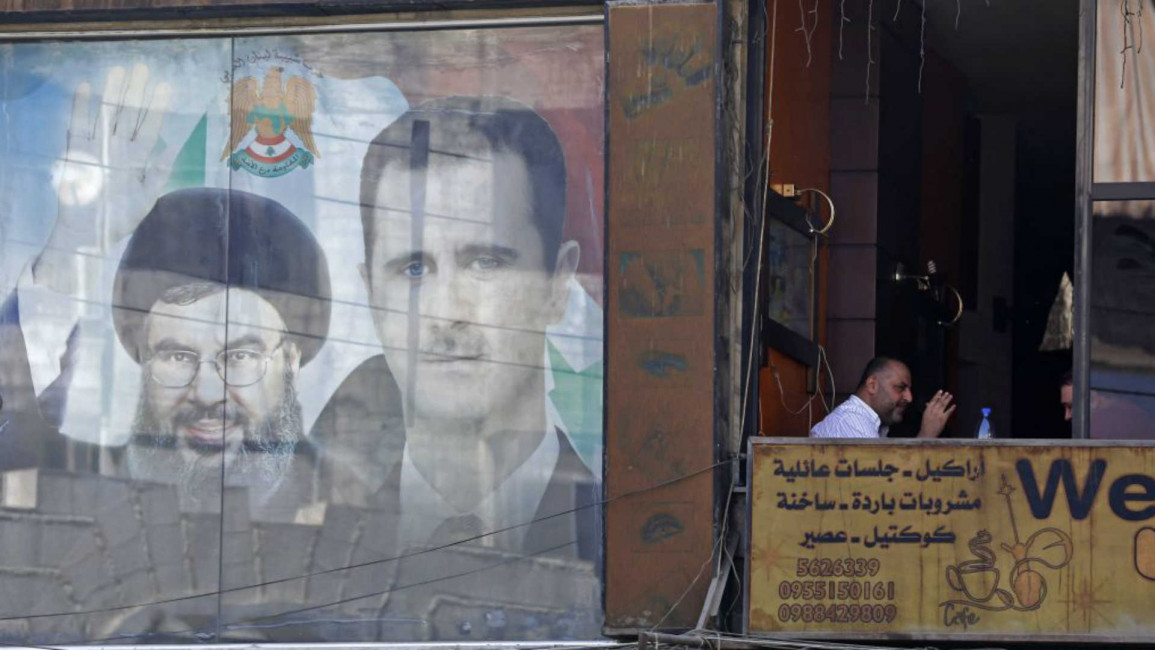
If Riyadh was serious about countering Iran, it should have supported the Syrian revolution
George Orwell however, pointed out that they "did not happen any the less, because The Daily Telegraph has suddenly found out about them".
To paraphrase Orwell's sentiment: Just because Saudi Arabia says something happened doesn't necessarily mean it's untrue, regardless of how abhorrent we might find the House of Saud.
This is precisely the case regarding Riyadh's recent meltdown over Hizballah's growing hegemony over Lebanon and the apparently staged resignation of Lebanese Prime Minister Saad Hariri in Riyadh.
There is no doubt that Hizballah and thus Iran's leaders have political hegemony over Lebanon. There's also just cause to believe that Hariri may have faced serious death threats emanating from Hizballah and Iran. That Saad might one day face the same fate as his assassinated father Rafik is hardly preposterous.
Lebanon could be considered a near-failed state if one conceives of the functionality of a state as one underpinned by proper self-determination. Hizballah has engulfed Lebanon and can bring almost any aspect of the state to a standstill.
Far from their influence waning in the post-Cedar Revolution age, Lebanon cannot now even form a government without the consent of Hizballah and thus Iran by proxy.
 |
Lebanon cannot now even form a government without the consent of Hizballah and thus Iran by proxy |  |
Hariri's resignation and the consequent Saudi rhetoric claiming that Lebanon had declared war against the kingdom came within the context of a Houthi missile, allegedly sourced to Hizballah, nearly hitting King Khalid airport.
In addition, there has been unprecedented ascendancy of the Crown Prince Muhammad bin Salman, who is widely believed to be in favour of a more aggressive stance regarding Iranian expansionism in the region.
However, if Riyadh was ever serious about curtailing Iranian expansionism, it ought to have prioritised what has become the crowning glory of this policy in the modern era; the Syrian war.
One common misconception is that the Syrian war became a "proxy war" between Iran and Saudi Arabia, with Iran supporting Assad and Saudi supporting the rebels. There is some undeniable truth in this dynamic, but to accept it without nuance is inaccurate.
Read more: Syria's war has produced no victory, only victims
At no point during the Syrian civil war did Saudi Arabia ever match the support it provided to some rebels with the support Iran provided to Assad.
Saudi Arabia provided inconsistent shipments of weapons that were dispersed ideologically among rebel forces it thought would best serve its interests, as well as providing financial aid to some opposition groups. Now, of course, it funds only forces that fight IS and not Assad.
Iran, on the other hand, not only provided Assad with billions annually, to keep the economy of his rump state afloat, but it provided huge amounts of weapons, military equipment and invaded the country, both with its own Revolutionary Guards and with its proxy militias, the most prominent of which was Hizballah.
If Saudi Arabia and its Arab allies had united and provided the rebels with the necessary resources to fight Assad and his allies, Syria could have become a graveyard for Hizballah and the Iranian expansionism it represents.
 |
At no point during the Syrian civil war did Saudi Arabia ever match the support it provided to some rebels with the support Iran provided to Assad. |  |
It's perfectly true that there would have been no guaranteed stability if the rebels had managed to overthrow Assad, but it would have physically cut the land link between Iran and Hizballah, as well as taking out one of the members of the so-called "Axis of Resistance", which "resists Zionism" by murdering one Syrian civilian at a time.
Riyadh and its allies had the necessary resources, while people forget how close Assad was to defeat with only meagre aid from a few sources. Before Russia swooped in to save Assad and Iran from defeat at the hands of the newly unified rebel coalitions in 2015, Saudi Arabia could have used its high-tech air force to aid the rebels.
Instead, it uses it to annihilate Yemen, due to the rise of a counter-revolutionary alliance between the Houthis and forces loyal to ousted tyrant, Ali Abdullah Saleh.
Saudi airstrikes falling on Yemeni hospitals might have been a common sight - punishing what was already the region's poorest country. But not one Saudi plane could be seen bombing Assad's chemical facilities, or helping protect civilian populations in Aleppo, Idlib, Homs or any other liberated area of Syria from Assad and Iran's forces.
Similarly, the Saudi-led Peninsula Shield Force marched into neighbouring Bahrain to smash the budding non-sectarian revolution that almost gripped that country. No Saudi soldier would have ever dared to set foot in Syria to protect Syrians fighting its alleged great enemy, Iran.
Riyadh and its allies could have used their huge monetary resources to build up not just Syrian rebels, but the revolutionary civil society organisations that sprung up in defiance of Assad and Iran's counter-revolution.
Twitter Post
|
Instead, it, and its ally the UAE, spent billions of dollars ensuring that the pro-Assad, pro-Russia Sisi smashed the budding Egyptian democracy and overthrew the democratically elected Islamist president Mohamed Morsi, who Saudi Arabia saw as a bigger threat than Iran due to his membership of the Muslim Brotherhood.
Mobilising diplomatic might to put as much pressure as possible on the world to act to stop a genocide against the Sunnis in Syria it supposedly represents, was also an option. Instead, the kingdom blockaded Qatar, one of the few remaining allies of the Syrian revolution, precisely because it was perceived to support groups like the Brotherhood - groups that support democratic Islamism.
In truth, Saudi Arabia would never have done any of this; such things would go against the very nature of the ruling forces in the kingdom. They who despise democracy in the region, share much more in common with Iran than they do with any force that seeks liberty and justice.
This applies more generally, too. When we warned that the flames of the Syrian counter-revolution would not be confined to the now almost meaningless borders of Syria, this is precisely what we meant.
The contagion of sectarianism and Islamophobia in Syria, both as real and vicious phenomena and as something to be exploited, would triumph and threaten the stability of the region and potentially the whole world. IS was simply one uncontrollable dimension of the counter-revolution in Syria.
In Lebanon alone, the main threat isn't to Lebanese citizens who seem in general happy to co-exist with Hizballah, but more to the 1.7 million mostly Sunni Syrian refugees who dwell within the country, where they face extreme racism.
The Lebanese foreign minister, from the Christian Free Patriotic Movement, declared openly on Twitter regarding his government's refusal to naturalise Syrian refugees that "we are racist in our Lebanese national identity".
In Lebanon's "confessional democracy", wherein sectarianism is the foundation of the state, the presence of 1.7 million Sunni Syrians throwing the "confessional" balance off kilter is itself a potential source of conflict. It's certainly something that unites fascistic factions of the Christian community with Hizballah and its supporters.
While Saudi Arabia waging all-out war on Lebanon to try to destroy Hizballah seems unlikely, the fact that it is now being spoken about as a reality ought to hit home: The appeasement of the counter-revolution in Syria is one of the great disasters of the 21st century.
Sam Hamad is an independent Scottish-Egyptian activist and writer.
Opinions expressed in this article remain those of the author and do not necessarily represent those of The New Arab, its editorial board or staff.




